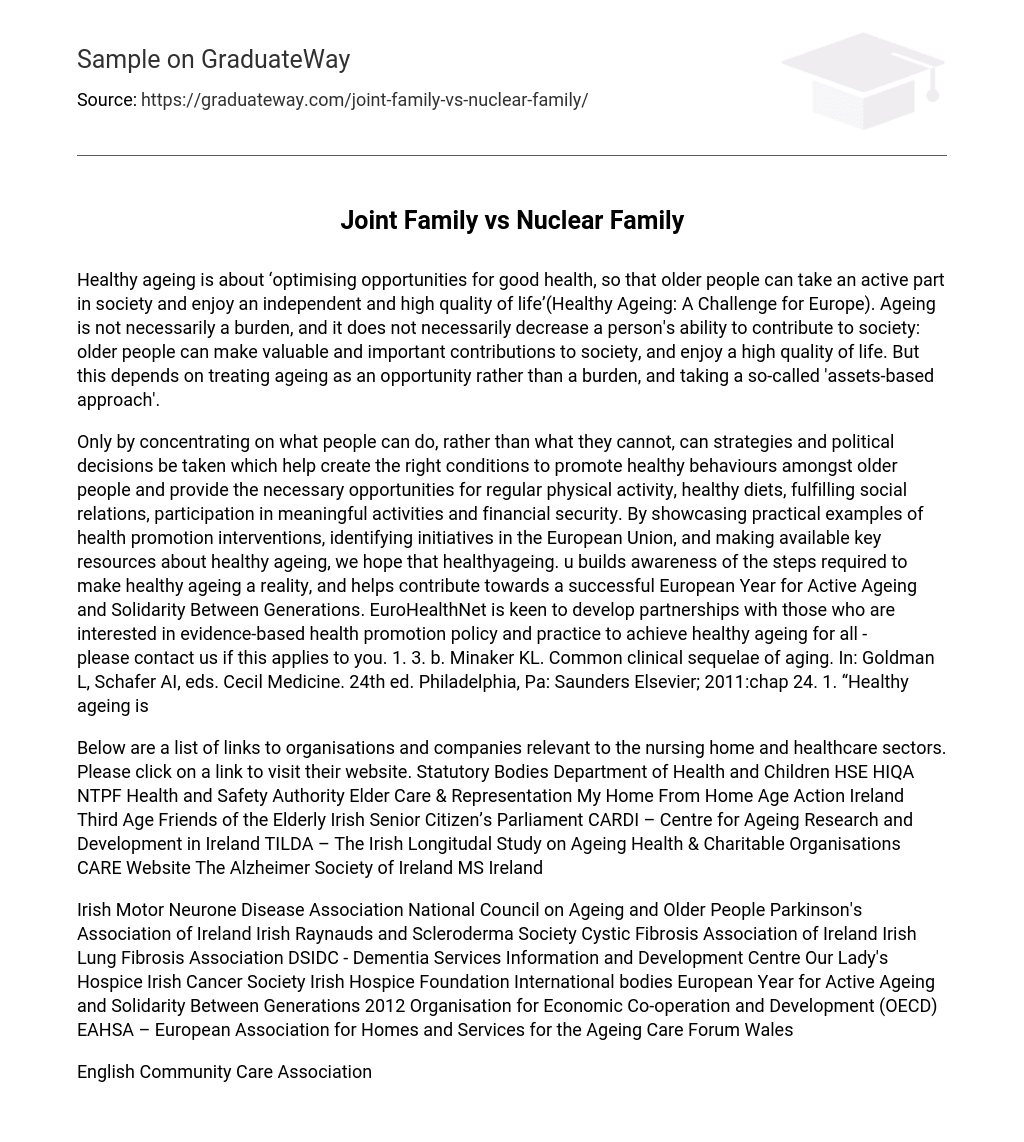Healthy ageing is the process of optimizing opportunities for good health in order for older individuals to actively participate in society and maintain a high quality of life. According to Healthy Ageing: A Challenge for Europe, ageing does not have to be seen as a burden or decrease one’s ability to contribute to society. In fact, older individuals can make significant and valuable contributions while enjoying a high quality of life. However, this is contingent on viewing ageing as an opportunity and adopting an assets-based approach.
Only by focusing on people’s abilities rather than their limitations, can we develop strategies and make political decisions that promote healthy behaviors among older individuals. These decisions can also create the necessary conditions for regular physical activity, healthy diets, fulfilling social relationships, meaningful activities, and financial security. Our goal is to increase awareness of the steps required to achieve healthy aging and contribute to a successful European Year for Active Ageing and Solidarity Between Generations. We provide practical examples of health promotion interventions, highlight initiatives in the European Union, and offer resources on healthy aging. EuroHealthNet is interested in partnering with those who are dedicated to evidence-based health promotion policy and practice for healthy aging. If this applies to you, please contact us (hyperlink)
1. 3. b. Minaker KL. Common clinical sequelae of aging. In: Goldman L, Schafer AI, eds. Cecil Medicine. 24th ed. Philadelphia, Pa: Saunders Elsevier; 2011:chap 24. 1.
“Healthy ageing is”
Here is a list of links to organizations and companies that are relevant to the nursing home and healthcare sectors. Simply click on a link to visit their website:
Statutory Bodies
– Department of Health and Children
– HSE
– HIQA
– NTPF
– Health and Safety Authority
– Elder Care & Representation
– My Home From Home
– Age Action Ireland
– Third Age
– Friends of the Elderly
– Irish Senior Citizen’s Parliament
– CARDI – Centre for Ageing Research and Development in Ireland
– TILDA – The Irish Longitudal Study on Ageing
Health & Charitable Organisations
– CARE Website
– The Alzheimer Society of Ireland
– MS Ireland
Irish Motor Neurone Disease Association National Council on Ageing and Older People Parkinson’s Association of Ireland Irish Raynauds and Scleroderma Society Cystic Fibrosis Association of Ireland Irish Lung Fibrosis Association DSIDC – Dementia Services Information and Development Centre Our Lady’s Hospice Irish Cancer Society Irish Hospice Foundation International bodies European Year for Active Ageing and Solidarity Between Generations 2012 Organisation for Economic Co-operation and Development (OECD) EAHSA – European Association for Homes and Services for the Ageing Care Forum Wales
The English Community Care Association, Independent Health and Care Providers, National Care Association, National Care Forum, Scottish Care, and United Kingdom Homecare Association all have significant roles in providing care and support to individuals in the United Kingdom. In India, joint families were once common but are now rare unless there is a shared business among family members. Most salaried children prefer to live away from their hometowns and have nuclear families. Both types of families have advantages and disadvantages.
Joint families typically foster stronger bonds between members, better cost control, educational assistance, and moral support. Having more people in the family allows for sharing problems and grief. Conversely, nuclear families may feel neglected at times especially when both parents work. However, being raised in a joint family can instill better manners, respect for others, and increased responsibility.
Disadvantages of joint families include lack of freedom and excessive intrusion leading to misunderstandings and financial disputes. Nuclear families appreciate each other more due to limited interaction among members but conflicts can arise from constant questioning by elderly relatives particularly among younger individuals.
It is important to acknowledge that property disputes are common in joint families. However, the fundamental aspect that determines the nature of a family, whether joint or nuclear, lies in the respect shown towards elders and the unity among its members.
Every family member should prioritize supporting one another during times of need. Ultimately, it is each individual’s responsibility to recognize their duties. I concur with the idea that a joint family can be perceived as an unspoken blessing.
Living in a joint family promotes happiness by encouraging the exchange of opinions, emotions, and ideas among its members. Shared laughter and meals bring joy, while collective decision-making helps address complex issues. Distributing tasks among family members not only adds to the happiness but also prevents monotony. The elderly provide guidance and support, while younger individuals benefit from sharing positive experiences. Residing in a joint family environment also fosters the development of religious values and spiritual peace.





